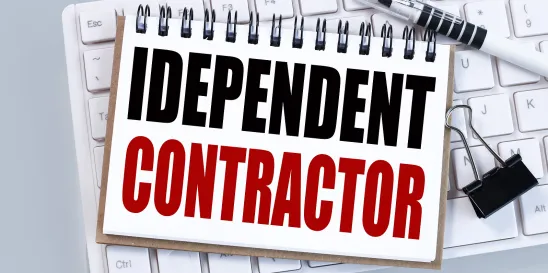On November 22, 2023, Governor Kathy Hochul of New York State signed into law the “Freelance Isn’t Free Act” (“Act”), which was modeled after a similar law passed in New York City in 2017. The state law becomes effective on May 20, 2024, and is designed to protect freelance workers by requiring timely payments, providing a right to written contracts for their services and outlining the required provisions of those contracts, and establishing new legal claims and penalties for non-payment. Businesses in New York that rely on the services of non-employee independent contractors should be aware that such persons now have employee-like protections – even if properly classified as non-employee independent contractors.
The Act protects the “freelance worker,” defined as “any natural person or organization composed of no more than one natural person, whether or not incorporated or employing a trade name, that is hired or retained as an independent contractor.” The freelance worker must perform services with a value of $800 or greater, including multiple smaller projects aggregated over a 120-day period, in order to be covered by the Act. The Act has certain limited exceptions, including for sales representatives, practicing lawyers, licensed medical professionals, and construction contractors. Notably, the New York City law does not exclude construction contractors.
The Act requires any person who hires a freelance worker to pay the contracted compensation either on or before the date the compensation is due under the contract or, if the contract does not specify a date for payment, within 30 days after the completion of the services under the contract.
The Act also entitles each freelance worker to a written contract with the following minimum terms:
- The name and mailing address of both the hiring party and the freelance worker;
- An itemization of all services to be provided;
- The value of services to be provided;
- The rate and method of compensation;
- The date on which the compensation must be paid or the mechanism by which that date will be determined; and
- The date by which a freelance worker must submit a list of services rendered in order to meet any internal processing deadlines of the hiring party to ensure timely payment of the contract compensation.
A copy of the written contract must be retained by the hiring party for six years, and failure to retain the written contract for the required period may result in a presumption in favor of the freelance worker’s interpretation of the contract’s terms.
The Act creates three significant new legal claims for freelance workers, in addition to creating a complaint process with the New York Department of Labor. Freelance workers can bring claims under the Act for violation of its payment requirements, its contract requirements, or its anti-retaliation provision for individuals exercising or attempting to exercise rights under the Act. The potential liabilities vary by the type of claim brought. The Act assesses damages as follows:
- Failure to timely pay contract compensation – amount of unpaid compensation, equal amount of liquidated damages, reasonable attorneys’ fees, and injunctive relief.
- Failure to provide a written contract – $250 in statutory damages.
- Retaliation against a freelance worker – statutory damages equal to the value of the underlying contract.
In addition to those basic damages, freelance workers can also recover statutory damages equal to the value of the underlying contract if they can establish any other violation of the New York Labor Law’s article regarding wage payment. Finally, the New York Department of Labor can also seek a civil penalty of up to $25,000 in cases involving repeated violations demonstrating a pattern or practice of violating the Act.
It is not clear whether an independent contractor pursuing a claim under the Act will also be able to claim that they have been misclassified and qualify as an employee, thereby entitling the individual to additional rights afforded to employees. Notably, the Act provides that it does not “provid[e] a determination about the legal classification of any such worker as an employee or independent contractor,” suggesting that perhaps a freelancer could have their cake and eat it too by pursuing both types of claims.
Takeaway
Typically, businesses hiring independent contractors do so because it is a more flexible relationship that is not subject to the requirements and liabilities that accompany the employment relationship. New York is now bringing some of those requirements and liabilities to the contracting context. Businesses in New York that utilize independent contractors will need to review their contract forms to ensure compliance with the Act’s contract requirements. It is also advisable to carefully review, and strengthen, if necessary, contract provisions regarding payment timing in order to avoid disputes over the contractor’s right to payment that could implicate the Act.





 />i
/>i
